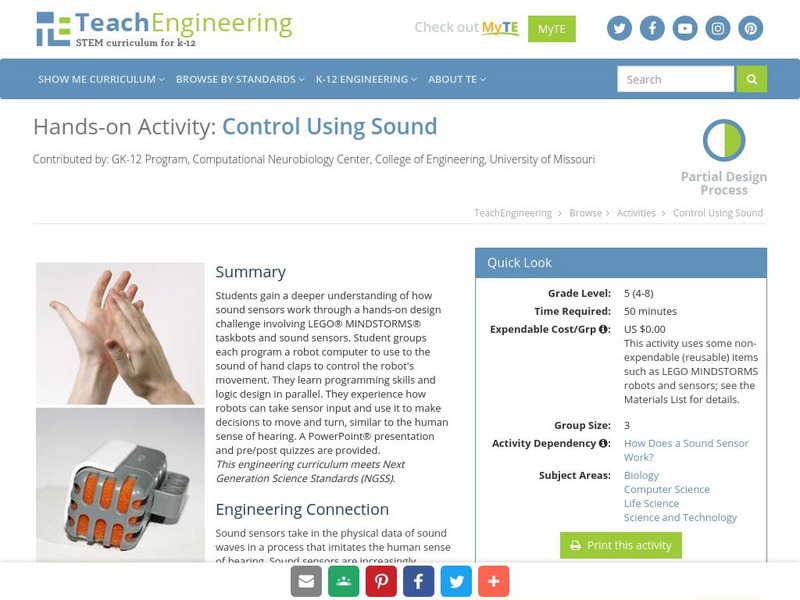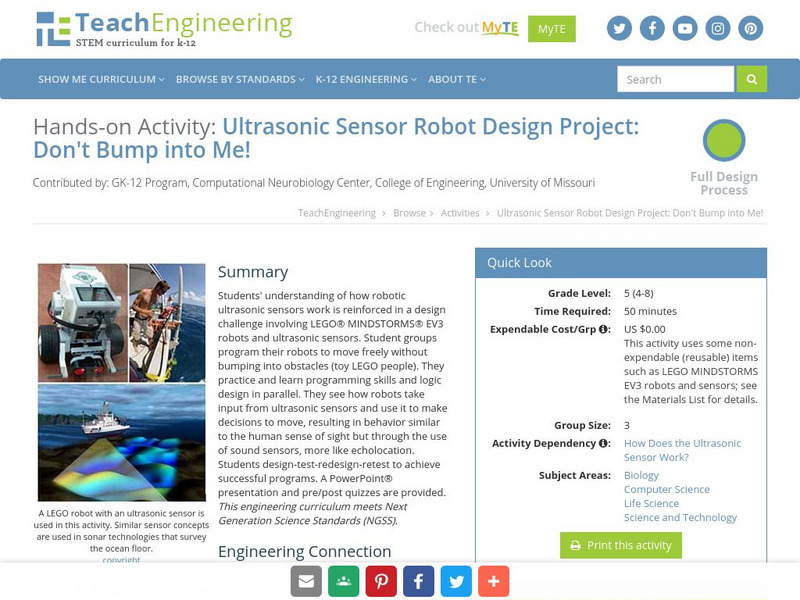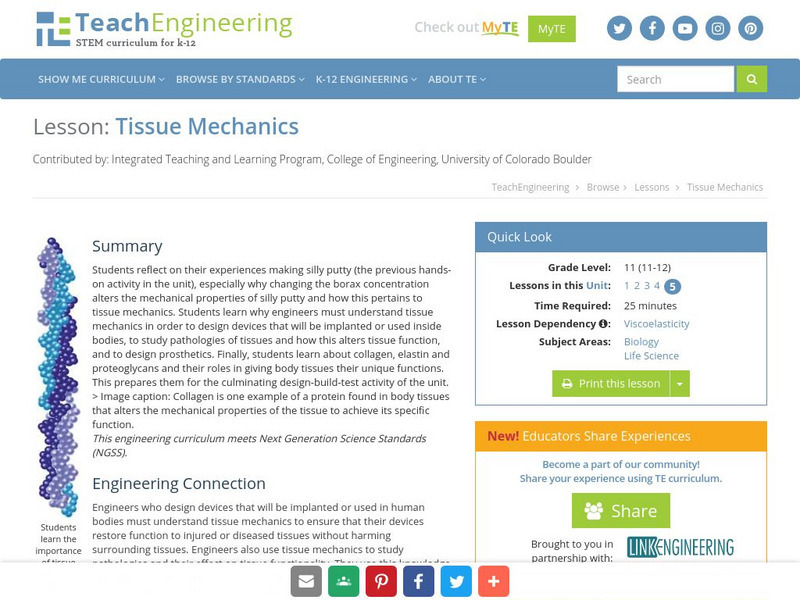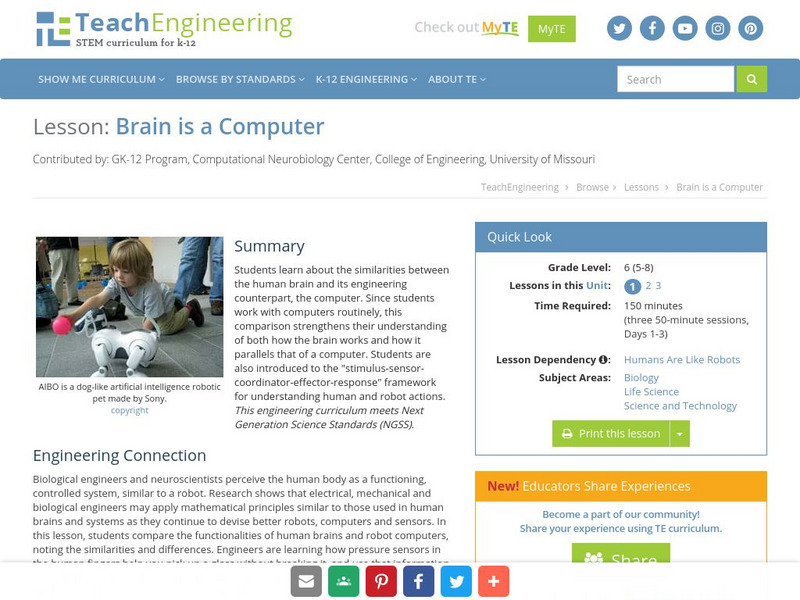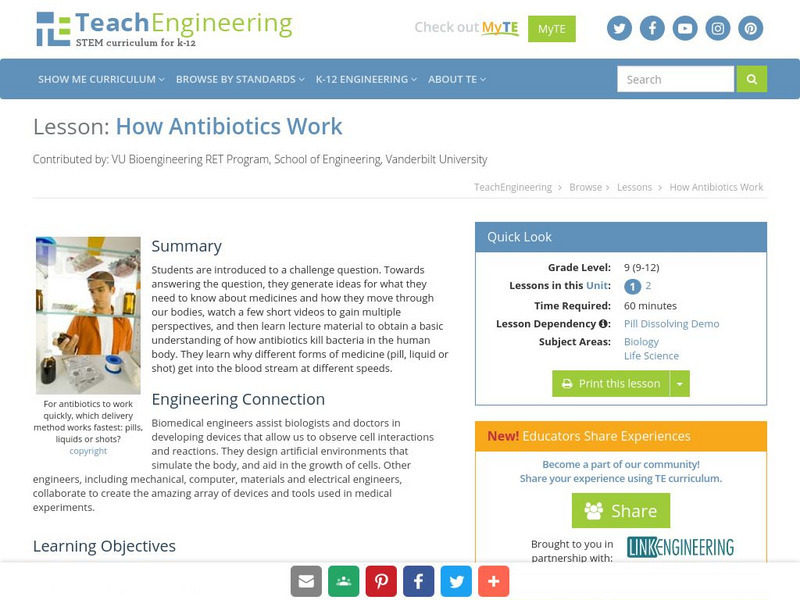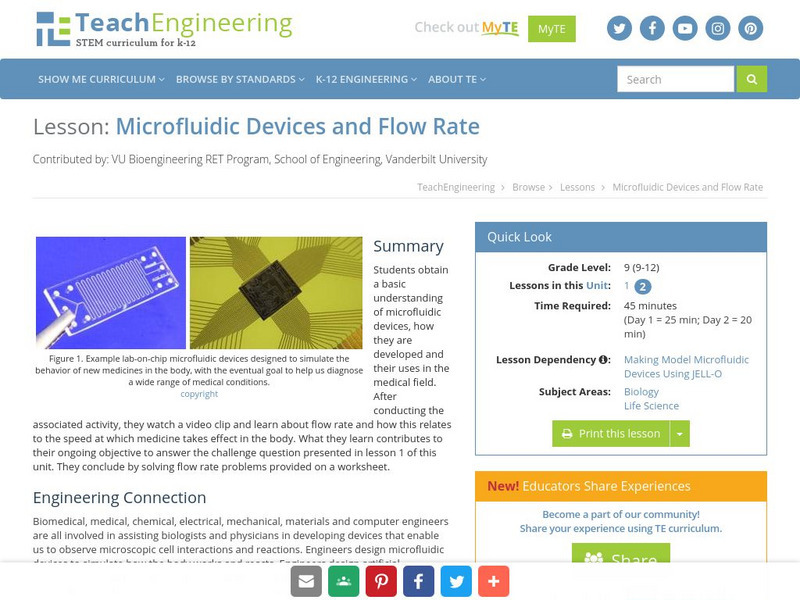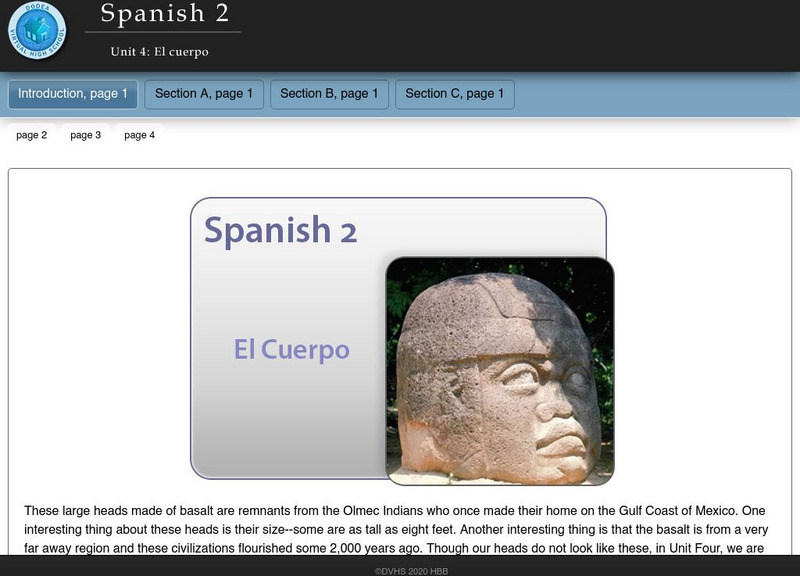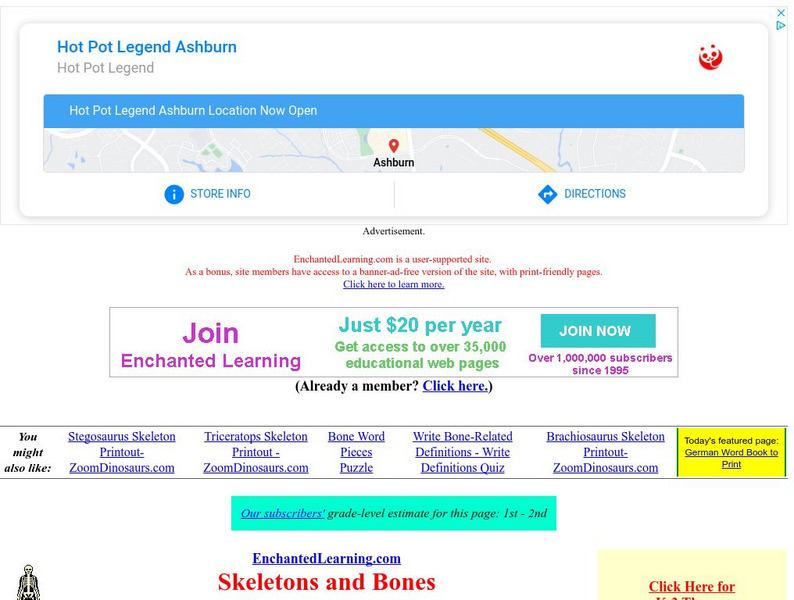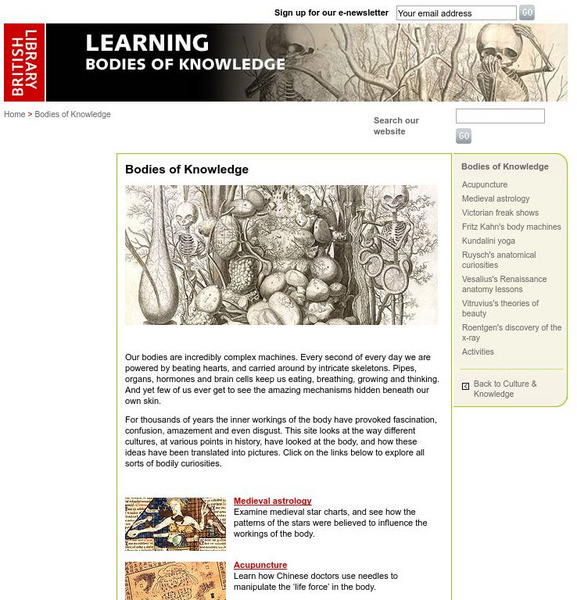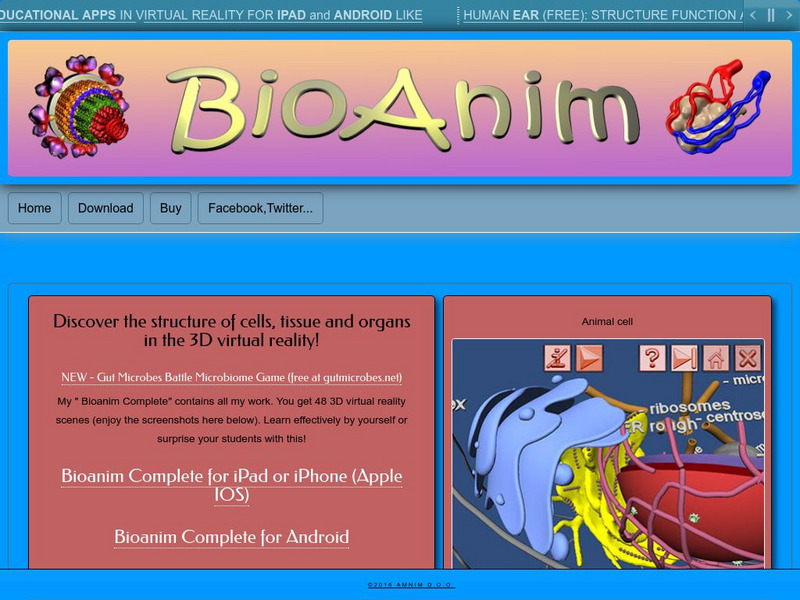Hi, what do you want to do?
TeachEngineering
Teach Engineering: Pupillary Response & Test Your Reaction Time
Students observe and test their reflexes, including the (involuntary) pupillary response and (voluntary) reaction times using their dominant and non-dominant hands, as a way to further explore how reflexes occur in humans. They gain...
TeachEngineering
Teach Engineering: Control Using Sound
Students gain a deeper understanding of how sound sensors work through a hands-on design challenge involving LEGO MINDSTORMS NXT taskbots and sound sensors.
TeachEngineering
Teach Engineering: Don't Bump Into Me!
Students' understanding of how robotic ultrasonic sensors work is reinforced in a design challenge involving LEGO MINDSTORMS NXT robots and ultrasonic sensors.
TeachEngineering
Teach Engineering: Pill Dissolving Demo
In a class demonstration, the teacher places different pill types ("chalk" pill, gel pill, and gel tablet) into separate glass beakers of vinegar, representing human stomach acid. After 20-30 minutes, the pills dissolve. Students observe...
TeachEngineering
Teach Engineering: Biomedical Engineering and the Human Body
Human beings are fascinating and complex living organisms-a symphony of different functional systems working in concert. Through a 10-lesson series with hands-on activities students are introduced to seven systems of the human...
TeachEngineering
Teach Engineering: Engineering and the Human Body
The Engineering and the Human Body unit covers the broad spectrum of topics that make up our very amazing human body. Students are introduced to the space environment and learn the major differences between the environment on Earth and...
TeachEngineering
Teach Engineering: Digestion Simulation
To reinforce students' understanding of the human digestion process, the functions of several stomach and small intestine fluids are analyzed, and the concept of simulation is introduced through a short, introductory demonstration of how...
TeachEngineering
Teach Engineering: Engineering the Heart: Heart Valves
Students learn how healthy human heart valves function and the different diseases that can affect heart valves. They also learn about devices and procedures that biomedical engineers have designed to help people with damaged or diseased...
TeachEngineering
Teach Engineering: Tissue Mechanics
Young scholars reflect on their experiences making silly putty (the previous hands-on activity in the unit), especially why changing the borax concentration alters the mechanical properties of silly putty and how this pertains to tissue...
TeachEngineering
Teach Engineering: Brain Is a Computer
Students learn about the similarities between the human brain and its engineering counterpart, the computer. Since students work with computers routinely, this comparison strengthens their understanding of both how the brain works and...
TeachEngineering
Teach Engineering: How Do Human Sensors Work?
This lesson highlights the similarities between human sensors and their engineering counterparts. Taking this approach enables students to view the human body as a system, that is, from the perspective of an engineer. Humans have...
TeachEngineering
Teach Engineering: How Antibiotics Work
Learners are introduced to a challenge question. Towards answering the question, they generate ideas for what they need to know about medicines and how they move through our bodies, watch a few short videos to gain multiple perspectives,...
TeachEngineering
Teach Engineering: Microfluidic Devices and Flow Rate
Students obtain a basic understanding of microfluidic devices, how they are developed and their uses in the medical field. After conducting the associated activity, they watch a video clip and learn about flow rate and how this relates...
Curated OER
Kids Health: About Kids Health
This page for the huge KidsHealth site gives you a jumping-off point and an overview of the site's content, purpose, and usage. With sections for parents, kids, and teens, KidsHealth has been online since 1995 and today it is accessed...
Other
Story md.com
Explore the astonishing world of health. Search 36,390 health topics and articles.
Department of Defense
Do Dea: Spanish 2: Unit 4: El Cuerpo
In this fourth unit of an intermediate Spanish course, students learn about and present information about the art, music, and literature of a Spanish-speaking country in Central America or the Caribbean. They also develop vocabulary...
Enchanted Learning
Enchanted Learning: Skeletons and Bones at Enchanted Learning
In this Enchanted Learning site, teachers and students will find great skeleton crafts, activities, and printouts.
Department of Defense
Do Dea: Spanish 3: Unit 6: La Salud
In this learning module, students learn how to talk about illness, the body, and one's health, and compare health care facilities in Hispanic countries to those in the US. Includes games, exercises, modeled vocalization of words and...
Discovery Education
Discovery Education: Lesson Plans Library K 5
This resource presents a lesson plan library which holds hundreds of lesson plans organized by grade level and subject area. Often rooted with an Internet research piece, each lesson plan contains specific objectives, procedures,...
British Library
British Library: Bodies of Knowledge
Series of illustrated essays on the different ways that the human body has been represented in art and science across history considers medieval astrology, the ancient Chinese practice of acupuncture, Vitruvius's notion of body symmetry,...
Other
Bio Anim
BioAnin presents 3-D labeled images of all of the major systems of the human body, for example, the digestive system and the endocrine system. The images are embedded in slideshows. The site also has interactive 3-D models that can be...
National Cancer Institute at the National Institutes of Health
Seer Training Modules: Introduction to the Nervous System
Self-guided learning activity where students learn about the structure and function of the human nervous system. There is a short quiz at the end of the lesson to check for understanding.
National Cancer Institute at the National Institutes of Health
Seer Training Modules: Introduction to the Reproductive System
Self-guided learning activity where students learn about the structure and function of the male and female reproductive systems. There is a short quiz at the end of the lesson to check for understanding.
PBS
Pbs Learning Media: Meet My Muscles Upper Body Lesson Plan
Following along with their teacher, students learn about the various upper body muscles we have such as the bicep and pectoral muscles and learn how to give them a good stretch and exercise.






